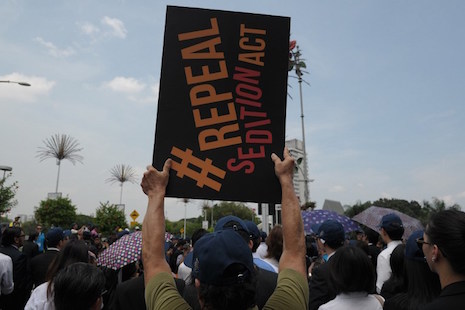Malaysia criminalizes dissent: Rights group
The Malaysian government in recent years has undertaken a systemic campaign to criminalize free expression — including religious expression — as a means of silencing critics, a rights group report reveals.
Oct 27, 2015

KUALA LUMPUR: The Malaysian government in recent years has undertaken a systemic campaign to criminalize free expression — including religious expression — as a means of silencing critics, a rights group report reveals.
The 147-page report by New York-based Human Rights Watch details how freedom of expression has been particularly attacked in the wake of Prime Minister Najib Razak's election in 2013 — in which the incumbent secured a parliamentary majority but lost the popular vote.
Since then, the government has actively pursued critics through legal channels, arresting and charging people for peaceful protests, blocking websites, sentencing opposition leaders and academics on spurious charges and wielding the blunt tool of the Sedition Act against many who dared fight back. Media, civil society, opposition politicians, and social media have all been targeted, notes the report.
Several of the cases have involved religion. Early this year, the controversial Sedition Act was amended to criminalize religious criticism. Even before then, however, "comments on the government's handling of religious issues have also resulted in arrests and sedition charges."
In August 2014, Member of Parliament Khalid Samad was charged with sedition "after he called for review of the powers of the Selangor State Islamic Religious Council after it failed to abide by the attorney general's decision that Iban and Malay-language Bibles seized from the Bible Society of Malaysia should be returned."
This year, a prominent rights lawyer named Eric Paulsen was arrested twice and charged with sedition when he tweeted that sermons from the government's Malaysian Islamic Development Department promoted extremism. Rafizi Ramli, secretary general of the People's Justice Party, faces multiple charges after bringing attention to mounting anti-Christian protests suggesting they had been organized by the ruling United Malays National Organisation.
While these critics have been swiftly dealt with, those with powerful connections enjoy far greater freedoms. The report points to a case from April when protesters, (among them, the brother of the police inspector general) who called for a church to remove its cross, were all let off.
"It is crucial to look at the fact that violence is being justified. If I make a statement about the use of Allah and the Bible and it results in the burning of churches, the ones who burned the churches won't get penalized, but the one who used the word Allah gets arrested. This justifies the violence and leads to impunity," the report quotes activist Maria Chin Abdullah as saying.
Phil Robertson, deputy director of Human Rights Watch's Asia Division, told ucanews.com that the government was "creating a culture of fear [with which] they hope to intimidate people."
"The problem is that the government is criminalizing free expressions in many different aspects of ordinary life and that also includes religion," he said.--Ucannews







Total Comments:0